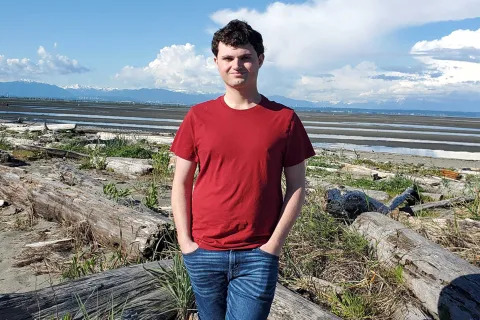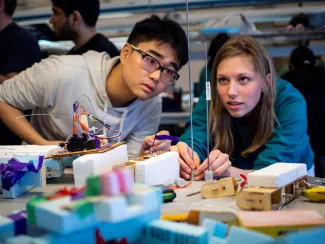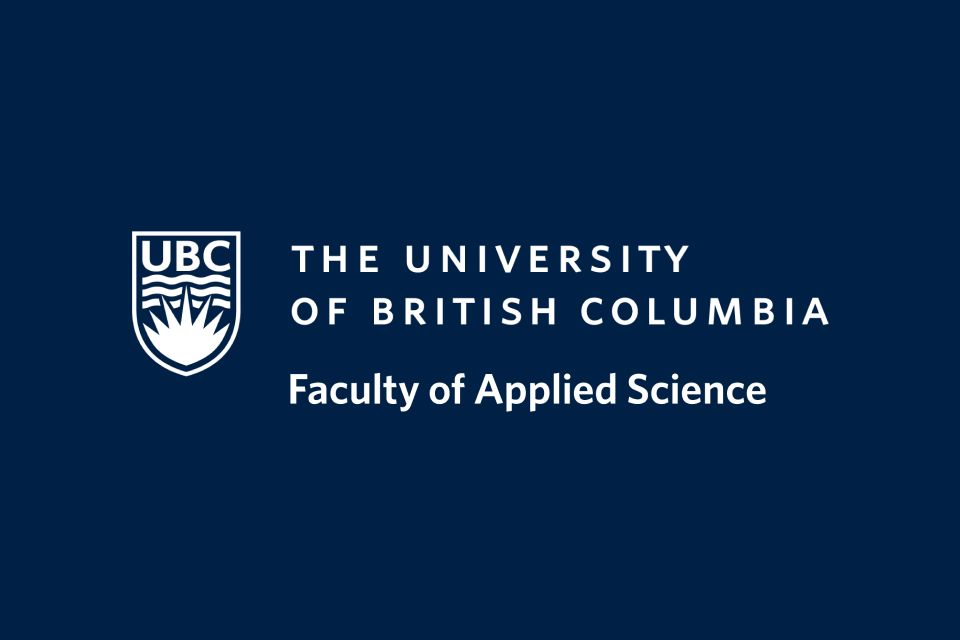"Your degree is what you make it - take advantage of everything you can do to make it your own."

Josh Heieis
- Degree:
- Bachelor of Applied Science
- Grad year: 2022
- Program:
- Campus: Vancouver
Hi! I’m Josh, and I’m graduating this year from Mechanical Engineering specializing in Thermofluids, with a minor in Physics.
I was born and raised right here in Vancouver, and stayed close to home to go to UBC for my education. Right away in my first year, I joined the design team UBC Rocket, which turned out to be one of the best decisions of my degree. Later on, I did co-op positions at a few companies here in the lower mainland, and a total of 16 months at Tesla down in San Francisco. Now, 6 years after I started, I’m finally graduating, and heading down to New Zealand to start full time at Rocket Lab and keep working on the things I love.
Why did you choose to go into your field of study at UBC?
Back in high school, I spent a lot of time on my school’s robotics team, and had an interest in technology – I closely followed Tesla and SpaceX in particular, and kept up with anything else science or technology related. Combined with a natural affinity for math and physics, these experiences had made me realize that I wanted to do engineering. However, back then I was convinced that I wanted to continue with robotics and programming – so I had my sights set on either Engineering Physics, or Mechatronics as an alternative.
During first year, my focus shifted towards MECH due to what I was hearing about the different programs – MECH seemed to teach more hands-on, direct topics (which is what I was interested in), versus ENPH which focused a lot more on the theory behind engineering topics. In parallel, I had joined UBC Rocket right away when I started first year. I thought the work the team did in that first year was incredible, and it made me want to pursue whichever program would best allow me to learn how to do more of it as best as I could. That program turned out to be MECH, and in particular the Thermofluids option (although I would have gone into the Aerospace option had it been around back then).
What has made your time at UBC memorable?
Without a doubt the defining feature of my time at UBC was my design team, UBC Rocket. The experiences I had were all incredible – from going to competition in New Mexico in first year and placing first in our category, to working on and testing our own rocket engines, to going to competition events and meeting with teams from other schools doing the same thing as us, and not to mention the friends I made along the way. This team ended up shaping my degree almost more than the classes I took.
Honorable mentions go to the MECH 2 design projects, my Capstone project in 5th year, and the co-op program for making it possible for me to work in San Francisco for a year.
How are you applying the skills you learned through your studies at UBC?
I have been fortunate enough to have had several co-op terms at Tesla, where I was able to apply many of the skills I’ve learned in class to make measurable impacts in my team and on the products the company ships. It was also a very valuable learning experience that complemented my courses quite well.
After graduating, I am now starting full-time at Rocket Lab, where I will be applying everything I’ve learned through my university studies (both classes and design team). I am very excited to be able to contribute to the future of space travel.
What advice would you give a student entering your degree program?
Definitely consider all your options of how you can make your degree your own. Co-ops (maybe even more than the standard 5 terms), exchange programs, minors, design teams – there are a lot of ways you can modify your degree to really suit what you want.
I’ve found that the exact program you enter (MECH, ENPH, IGEN, etc) doesn’t matter as much as the other experiences you have that enhance your university experience – both for your personal happiness and for your future career. Your degree is so much more fulfilling when you have these other experiences – having fun at design team competitions, living abroad for a few terms, and meeting many new friends.
How did your studies in the Faculty of Applied Science prepare you for the future of work?
Whatever may change in the future, the foundations of engineering that we learn will remain constant. Having the last few years of my studies being through the COVID pandemic also helped in an unexpected way – we were all forced to change the way we work and study, which will help deal with anything that may come in the future.



